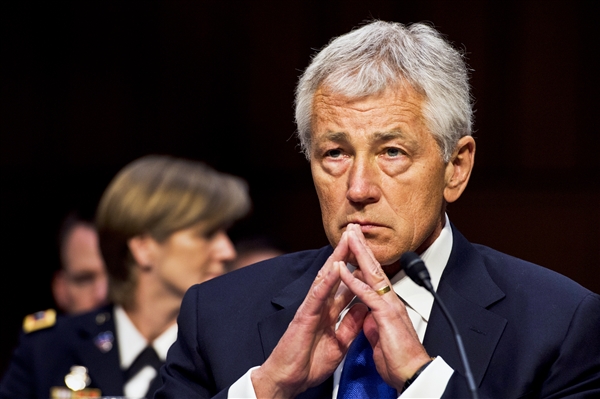Hagel Warns Congress Against Isolationism; Renews Call For Soft Power
Posted on

UPDATED: Adds Details, Context From Hagel’s CSIS Speech
WASHINGTON: Defense Secretary Chuck Hagel grabbed the bull by the horns and warned Congress and the American people against slipping into isolationism as we withdraw from the wars we have fought for the past dozen years, saying “looking inward is just as deadly a trap as hubris.”
“More Americans, including elected officials, are growing skeptical about our country’s foreign engagements and responsibilities. But only looking inward is just as deadly a trap as hubris, and we must avoid both in pursuing a successful foreign policy in the 21st century,” Hagel says in his speech at eight this morning at the influential Center for Strategic and International Studies (CSIS). (I added the emphasis on elected officials). Pentagon officials, eager to boost the speech’s profile, issued excerpts of it for release before delivery.
Hagel’s remarks are clearly aimed in large part at the growing chorus of those on Capitol Hill in the farther reaches of both the Republican and Democratic parties who argue America should scale back its overseas commitments, close foreign bases, and stay out of what George Washington called “foreign entanglements.”
He strikes a judicious pose, warning against both “hubris” (read George Bush and Iraq) and isolationism. But he also seeks a balance between hard and soft power: “Just as overdependence on the military carries with it risks and consequences, letting our military strength atrophy would invite disaster.”
But Hagel reminds the audience that no other country will dominate global affairs in economic and military terms as will the United States. And he pointedly told some who think they see a country in decline that they are wrong.
“We must not fall prey to the false notion of American decline. That is a false choice and too simple an explanation. We remain the world’s only global leader. However, the insidious disease of hubris can undo America’s great strengths. We also must not fall prey to it,” Hagel said. “National and personal anxieties about change and the rate of change will continue to dominate much of the public debate. These must be placed in a broader context – particularly because so many of the challenges facing us are political, not structural. We remain the world’s pre-eminent military, economic, and diplomatic power. And even as we deal with new budgetary constraints on defense spending, the United States will continue to represent nearly 40 percent of global defense expenditures.”
Hagel reminds the CSIS audience of the truths that, “No other nation has the will, the power, the capacity, and the network of alliances to lead the international community.” But we must also remember, he says, that “sustaining our leadership will increasingly depend not only on the extent of our great power, but an appreciation of its limits and a wise deployment of our influence.”
At the end of his speech, he offers these words: “We must not fear change, but rather embrace it. To strive for less would be unworthy of our character and our purpose, and we would fail future generations. That is not who we are – that is not our heritage – that is not our destiny.”
In background remarks accompanying the speech excerpts, a senior defense official says the speech includes six priorities Hagel “discussed with the Service Chiefs and Combatant Commanders at their meeting last week. These priorities are informed by lessons learned from the Strategic Choices and Management Review and will serve as inputs to the FY15 budget proposal” — to be unveiled in February — “and the upcoming QDR” — the congressionally mandated Quadrennial Defense Review. Here are those six priorities:.
Institutional reform. “Coming out of more than a decade of war and budget growth, there is a clear opportunity and need to reform and reshape our entire defense enterprise – including paring back the world’s largest back-office.”
Reexamine assumptions undergirding our forces. “I’ve asked our military leaders to take a close look at these assumptions, which will also be re-evaluated across the services as part of the QDR. The goal is to ensure they better reflect our goals in the shifting strategic environment, the evolving capacity of our allies and partners, real-world threats, and the new military capabilities that reside in our force and in the hands of our potential adversaries.”
Military readiness. “We may have to accept the reality that not every unit will be at maximum readiness, and some kind of a tiered readiness system is perhaps inevitable. This carries the risk that the President would have fewer options to fulfill our national security objectives.”
Protect capabilities spending. Space, cyber, special operations forces, and intelligence, surveillance and reconnaissance are the crown jewels that must be protected against the continuing erosion forced on the Pentagon by the mandatory budget cuts known as sequestration.
Balance. “In some cases we will make a shift, for example, by prioritizing a smaller, modern, and capable military over a larger force with older equipment. We will also favor a globally active and engaged force over a garrison military. We will look to better leverage the reserve component, tempered by the knowledge and experience that part-time units, in ground forces especially, cannot expect to perform at the same levels as full-time units, at least in a conflict’s early stages.”
Personnel and compensation. Going forward, we will have to make hard choices in this area in order to ensure that our defense enterprise is sustainable for the 21st century. Congress must permit meaningful reforms as they slash the overall budget.”
Subscribe to our newsletter
Promotions, new products and sales. Directly to your inbox.
